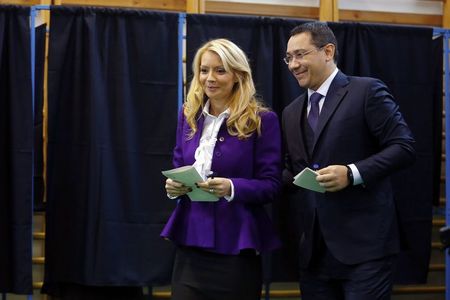By Radu-Sorin Marinas and Luiza Ilie
BUCHAREST (Reuters) - Prime Minister Victor Ponta led the first round of Romania's presidential election, a step towards a victory that would consolidate his leftist party's hold on power but would also raise questions about judicial independence.
With nearly all ballots counted, Ponta, leader of the Social Democrats and a former prosecutor and amateur rally driver who became prime minister two years ago, had won 40.3 percent of the vote in Sunday's election. That compared with 30.4 percent for his nearest challenger, Klaus Iohannis, an ethnic German mayor backed by two centre-right parties.
The results make Ponta, who has consistently led opinion polls over Iohannis, the firm favorite to win a run-off vote on Nov. 16.
A Ponta presidency could bring more stability to the Black Sea country of 20 million, which endured a painful recession and spending cuts during the global slowdown and has made mixed progress in implementing reforms under an IMF-led aid deal.
As prime minister, Ponta often feuded with his bitter rival, outgoing President Traian Basescu - who served as president for a decade - often slowing policymaking.
However, without the check on power hitherto provided by Basescu, Ponta's rise has raised concerns that he might tighten political control over the judiciary and anti-corruption prosecutors.
Ponta rebuffed EU criticism in 2012 that he did not appear to respect the rule of law and democratic institutions, denying allegations that he had put pressure on judges.
The results were announced with 98.3 percent of polling stations counted, and broadly reflected exit polls released on Sunday evening. They showed a turnout of 53 percent.
Many Romanians living abroad could not vote on Sunday as polling stations ran out of ballot-related paper, sparking protests outside the foreign ministry in Bucharest. Many also complained of long queues as they waited to vote. Tempers flared at the Romanian embassy in Paris, which called in the French police for help, according to an election bureau spokesman.
Ion Tiriac, a former French Open tennis doubles winner and one of Romania's richest businessmen, said he flew to Bucharest to vote after long queues prevented him from doing so in Paris.
IMF DEAL UNCERTAINTY
The leu currency (EURRON=) was stable against the euro on Monday, but 3-year treasury bond yields fell 5 basis points to 2.3 percent, a new record low. The blue chip index (BETI) was 0.2 percent stronger, bucking weaker stocks elsewhere in the region.
"The results are somewhat in line with what we have seen in exit polls, which isn't to say the final outcome is decided," said Vlad Muscalu, chief economist at ING Bank in Bucharest.
It was unclear whom Ponta might choose to succeed him as prime minister if he wins the presidency.
Ponta, and a new government he would help shape, might loosen fiscal policy and end the deal with the International Monetary Fund. The 4 billion euro agreement, which expires next year, has bolstered Romania's credibility with investors and nudged successive governments to reform.
"After the IMF agreement expires there will be two questions. Will it be further extended?" Greg Konieczny, the manager of Romanian investment fund Fondul Proprietatea (BX:FP), said in a recent interview.
"But that will be a decision for the new government. And second, if it is not extended, then will the government keep behaving in a responsible way?"
Iohannis, who is credited with transforming the Transylvanian city of Sibiu, has the support of opposition Liberals and Democrat-Liberals. He has pledged to support anti-corruption prosecutors, boost EU fund absorption and raise the healthcare budget, while supporting the IMF deal and aiming to eventually lower value-added tax.
Romania joined the EU in 2007 but remains its second- poorest and also one of its most corrupt states, driving millions abroad in search of better pay and living standards. It has struggled to absorb EU development funds. Tax evasion is rife and nearly half of all households lack an indoor bathroom.
"I am fed up with politicians and their corruption," said Marin Tudose, a 48-year-old tool maker. "When will we start to live better? Because so far it hasn't happened for me."
The Social Democrats, heirs to the Communists whose single-party rule was toppled in a 1989 revolution, have courted voters by increasing pensions and wages for state workers cut under Ponta's predecessor. Ponta has pledged to hike pensions again next year and has cut an employment tax.
Analysts said his election campaign was also helped by a government ordinance approved in August that allowed local mayors to join a party other than the one from which they were elected in office without losing their seat. That saw many politicians join the ruling leftists.
But his campaign was hit by setbacks as well. Basescu accused Ponta of spying for the foreign intelligence service in the 1990s - a charge Ponta's camp rejected as a political smear. Ponta's father-in-law and other ruling party politicians were also hit by graft allegations in the last weeks of the campaign.
In Romania, the president exerts influence on the executive by appointing the new prime minister, judges and prosecutors, and he can stall government policy proposals.
Ponta's attempt to have Basescu impeached in a 2012 national referendum drew sharp EU criticism and hurt the leu currency.
"Investors are very wary of Romanian politics causing selloffs in the currency," said Demetrios Efstathiou, the head of CEEMEA Strategy, Global Markets, at Standard Bank Plc.

"If investors feel that political risk in Romania is coming down, then it's possibly the elimination of the biggest risk for investors. So Ponta coming to power, his party controlling (parliament), I think it will be seen as positive not negative."
(Writing by Matthias Williams; Reporting by Matthias Williams, Radu-Sorin Marinas and Luiza Ilie; Editing by Susan Fenton)
